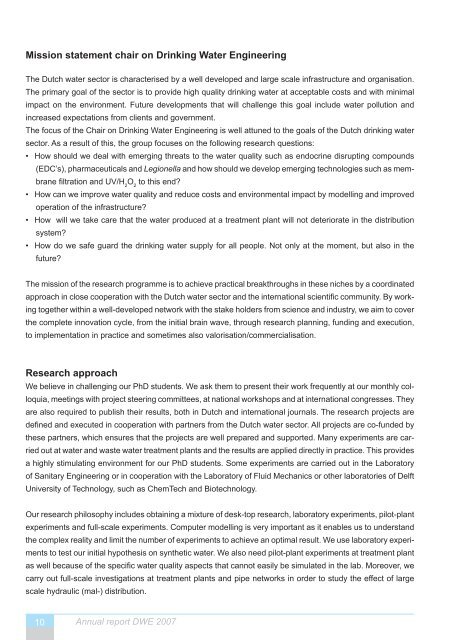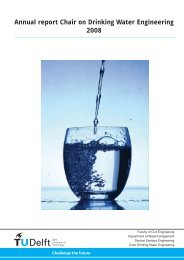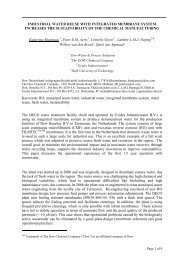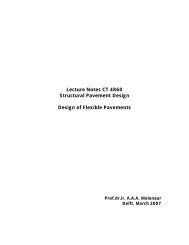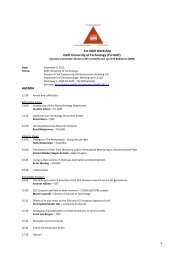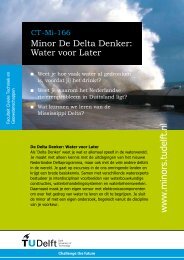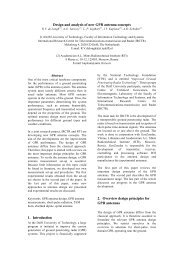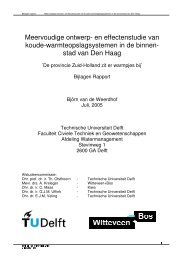Annual report Chair on Drinking Water Engineering 2007 - TU Delft
Annual report Chair on Drinking Water Engineering 2007 - TU Delft
Annual report Chair on Drinking Water Engineering 2007 - TU Delft
You also want an ePaper? Increase the reach of your titles
YUMPU automatically turns print PDFs into web optimized ePapers that Google loves.
Missi<strong>on</strong> statement chair <strong>on</strong> <strong>Drinking</strong> <strong>Water</strong> <strong>Engineering</strong><br />
The Dutch water sector is characterised by a well developed and large scale infrastructure and organisati<strong>on</strong>.<br />
The primary goal of the sector is to provide high quality drinking water at acceptable costs and with minimal<br />
impact <strong>on</strong> the envir<strong>on</strong>ment. Future developments that will challenge this goal include water polluti<strong>on</strong> and<br />
increased expectati<strong>on</strong>s from clients and government.<br />
The focus of the <str<strong>on</strong>g>Chair</str<strong>on</strong>g> <strong>on</strong> <strong>Drinking</strong> <strong>Water</strong> <strong>Engineering</strong> is well attuned to the goals of the Dutch drinking water<br />
sector. As a result of this, the group focuses <strong>on</strong> the following research questi<strong>on</strong>s:<br />
• How should we deal with emerging threats to the water quality such as endocrine disrupting compounds<br />
(EDC’s), pharmaceuticals and Legi<strong>on</strong>ella and how should we develop emerging technologies such as mem-<br />
������������������������ O to this end?<br />
2 2<br />
• How can we improve water quality and reduce costs and envir<strong>on</strong>mental impact by modelling and improved<br />
operati<strong>on</strong> of the infrastructure?<br />
• How will we take care that the water produced at a treatment plant will not deteriorate in the distributi<strong>on</strong><br />
system?<br />
• How do we safe guard the drinking water supply for all people. Not <strong>on</strong>ly at the moment, but also in the<br />
future?<br />
The missi<strong>on</strong> of the research programme is to achieve practical breakthroughs in these niches by a coordinated<br />
������������������������������������������������������������������������������������������������������������ing<br />
together within a well-developed network with the stake holders from science and industry, we aim to cover<br />
the complete innovati<strong>on</strong> cycle, from the initial brain wave, through research planning, funding and executi<strong>on</strong>,<br />
to implementati<strong>on</strong> in practice and sometimes also valorisati<strong>on</strong>/commercialisati<strong>on</strong>.<br />
Research approach<br />
We believe in challenging our PhD students. We ask them to present their work frequently at our m<strong>on</strong>thly colloquia,<br />
meetings with project steering committees, at nati<strong>on</strong>al workshops and at internati<strong>on</strong>al c<strong>on</strong>gresses. They<br />
are also required to publish their results, both in Dutch and internati<strong>on</strong>al journals. The research projects are<br />
������������������������������������������������������������������������������������������������������������<br />
these partners, which ensures that the projects are well prepared and supported. Many experiments are carried<br />
out at water and waste water treatment plants and the results are applied directly in practice. This provides<br />
a highly stimulating envir<strong>on</strong>ment for our PhD students. Some experiments are carried out in the Laboratory<br />
of Sanitary <strong>Engineering</strong> or in cooperati<strong>on</strong> with the Laboratory of Fluid Mechanics or other laboratories of <strong>Delft</strong><br />
University of Technology, such as ChemTech and Biotechnology.<br />
Our research philosophy includes obtaining a mixture of desk-top research, laboratory experiments, pilot-plant<br />
experiments and full-scale experiments. Computer modelling is very important as it enables us to understand<br />
the complex reality and limit the number of experiments to achieve an optimal result. We use laboratory experiments<br />
to test our initial hypothesis <strong>on</strong> synthetic water. We also need pilot-plant experiments at treatment plant<br />
��������������������������������������������������������������������������������������������������������������<br />
carry out full-scale investigati<strong>on</strong>s at treatment plants and pipe networks in order to study the effect of large<br />
scale hydraulic (mal-) distributi<strong>on</strong>.<br />
10 <str<strong>on</strong>g>Annual</str<strong>on</strong>g> <str<strong>on</strong>g>report</str<strong>on</strong>g> DWE <strong>2007</strong>


